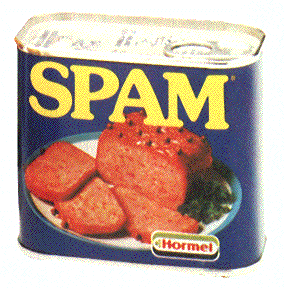
Quote: "Spam is a canned pork product that has entered into folklore. It is made by the Hormel Foods Corporation in (among other places) Austin, Minnesota (aka Spam Town USA).
The labeled ingredients in the original variety of Spam are chopped pork shoulder meat with ham meat added, salt, water, sugar and sodium nitrite. Other varieties of Spam differ; Spam Lite contains pork and chicken, and Spam Oven Roasted Turkey, a halaal food, is especially popular in Muslim markets.
The name "Spam" was chosen in the 1930s when the product, whose original name—"Hormel Spiced Ham"—was far less memorable, began to lose market share. The name was chosen from multiple entries in a naming contest. A Hormel official once stated that the original meaning of the name Spam was "Shoulder of Pork and hAM". According to writer Marguerite Patten in Spam – The Cookbook, the name was suggested by Kenneth Daigneau, brother of the Hormel vice president and an actor.
Other explanations of the origin of the term include the acronym "Specially Processed American Meat","Spiced Pork And haM", "Specially Processed Army Meat", and "SPAre hAM"; there are also some less-than-serious explanations, such as "Synthetically Produced Artificial Meat", "Some Parts Are Meat", or "Stuff Posing As Meat". The current official explanation is the SP and AM were taken from "SPiced hAM" to win a $100 prize.
According to Hormel's trademark guidelines, Spam should be spelled with all capital letters and treated as an adjective, as in the phrase SPAM luncheon meat. However, barring having entered into a contract requiring one to do so, no one is legally obliged to follow such trademark guidelines. As with many other trademarks, such as Lego or Kleenex, people often refer to similar meat products as "Spam".
"
Mucho appreciation to Nicholas Thompson for helping me and my mac get along with each other better.